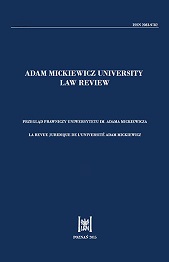On the Judicialisation of International Law
On the Judicialisation of International Law
Author(s): Adam WiśniewskiSubject(s): History of Law, International Law
Published by: Uniwersytet im. Adama Mickiewicza w Poznaniu
Keywords: public international law; jucicialisation; multiplication of international courts;
Summary/Abstract: The judicialisation of international law is a relatively recent phenomenon that gained momentum in the 1990s and 2000s. Coupled with the trend towards widespread compulsory jurisdiction, it has been crucial in strengthening the commitment of states to adhere to their international obligations. Another important effect of judicialisation on international law is that at least certain international norms have acquired an “objective” nature, detached from the will of states. This is because the interpretation and application of these norms is no longer dependent solely upon the subjective discretion of states, but is subject to consideration and examination by independent judicial bodies. The process of judicialisation, while contributing to the international rule of law, has undoubtedly changed the face of international law a great deal as a result of some other factors. The multiplication of international courts has led to the expansion of the judicial institutional layer, making international law less horizontal. Also, as a result of the growing case-law of these courts, the system of international law is becoming more complex and developed, and thus also more mature. The natural aspect of the judicial function is the development of international law. Despite the problems and risks involved, the proliferation of international courts and tribunals can be perceived as one of the important components of the dynamic transformation of international law during the recent decades.
Journal: Przegląd Prawniczy Uniwersytetu im. Adama Mickiewicza
- Issue Year: 2017
- Issue No: 7
- Page Range: 37-53
- Page Count: 17
- Language: English

